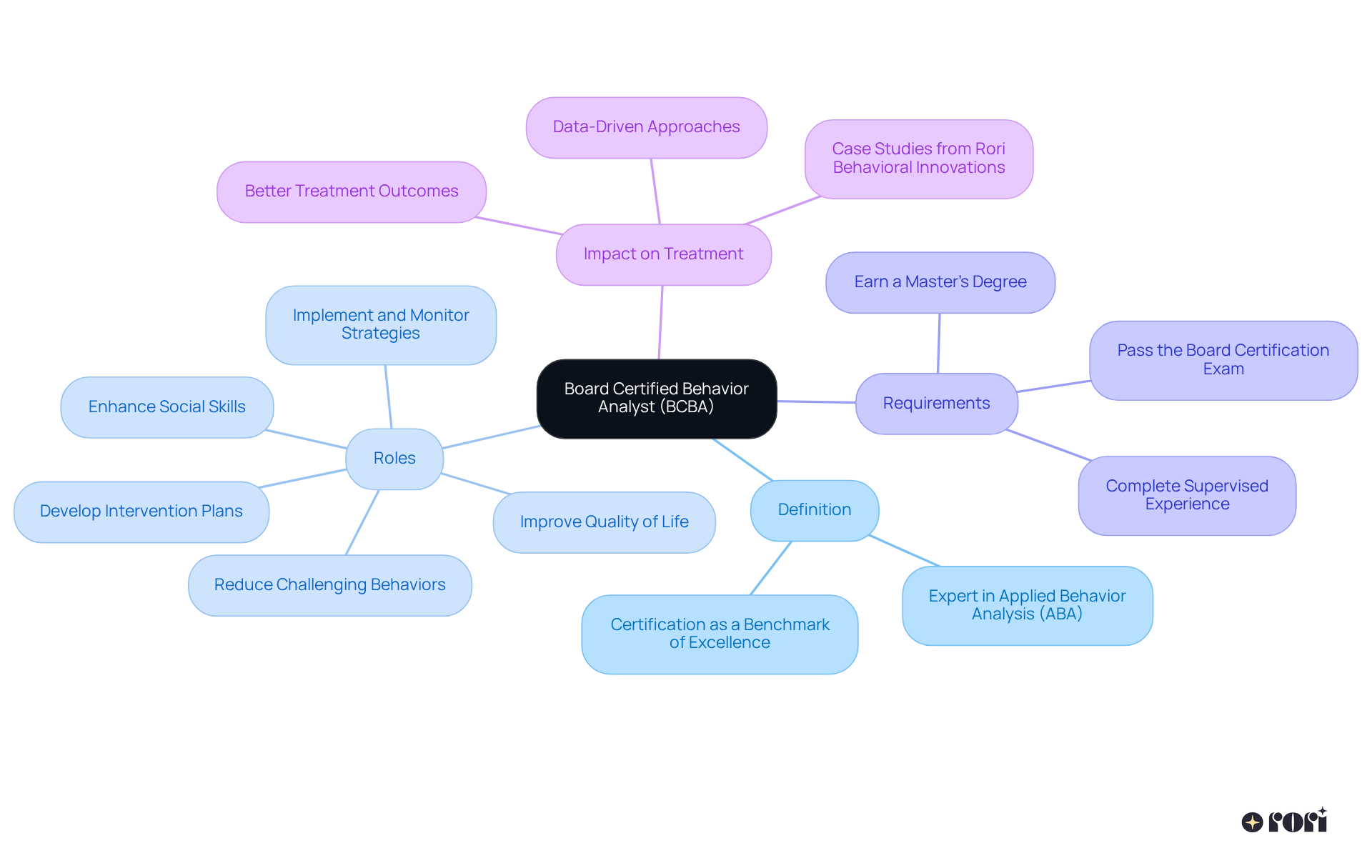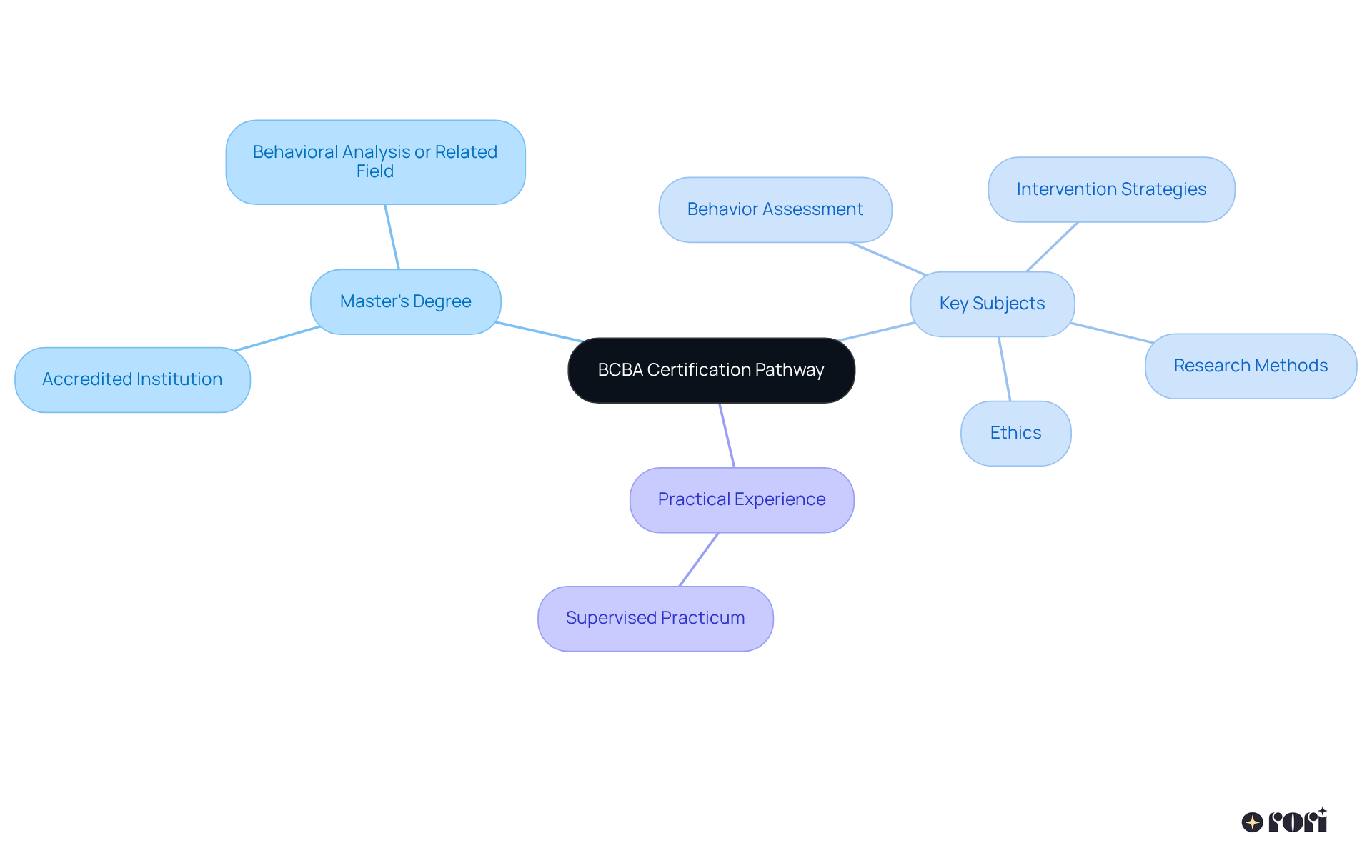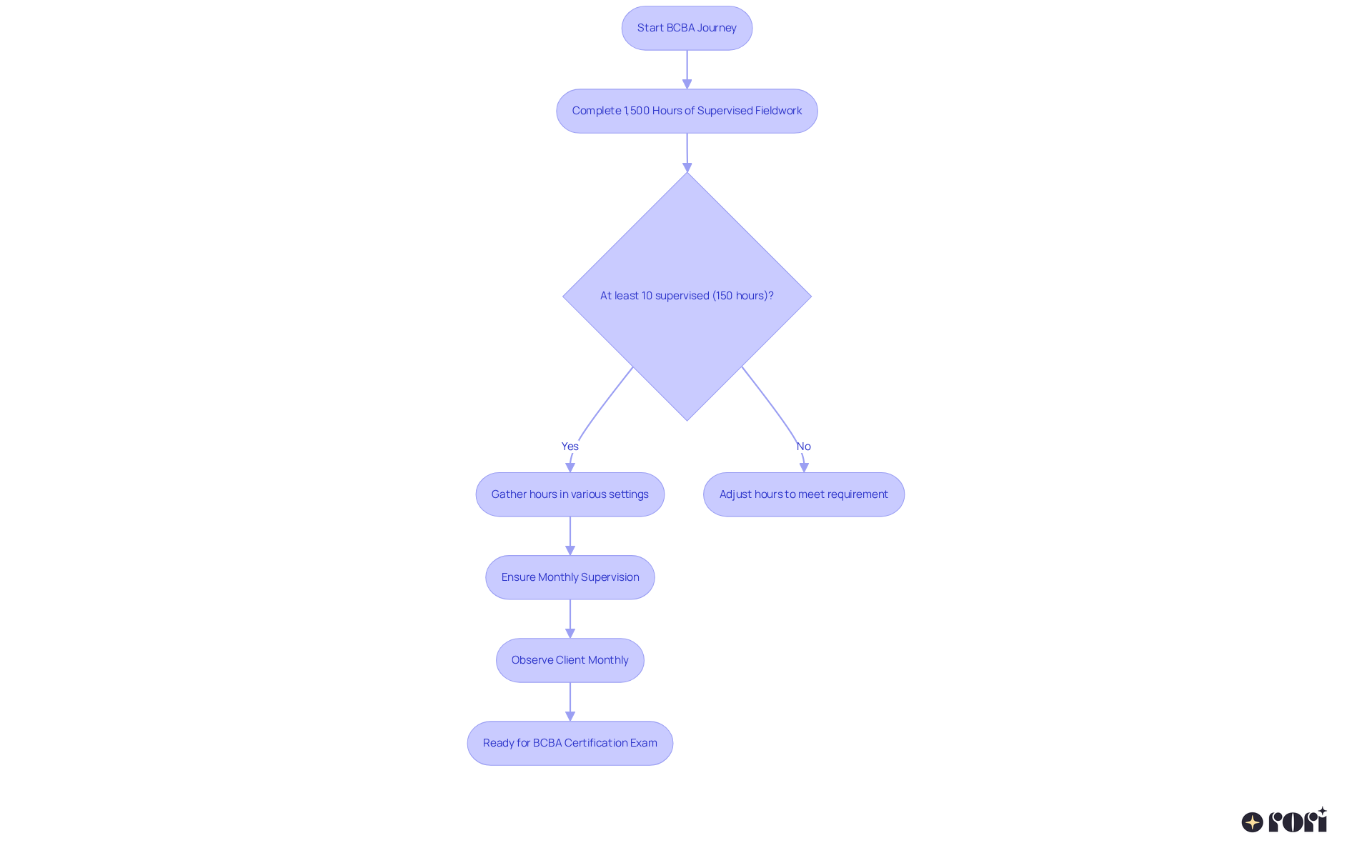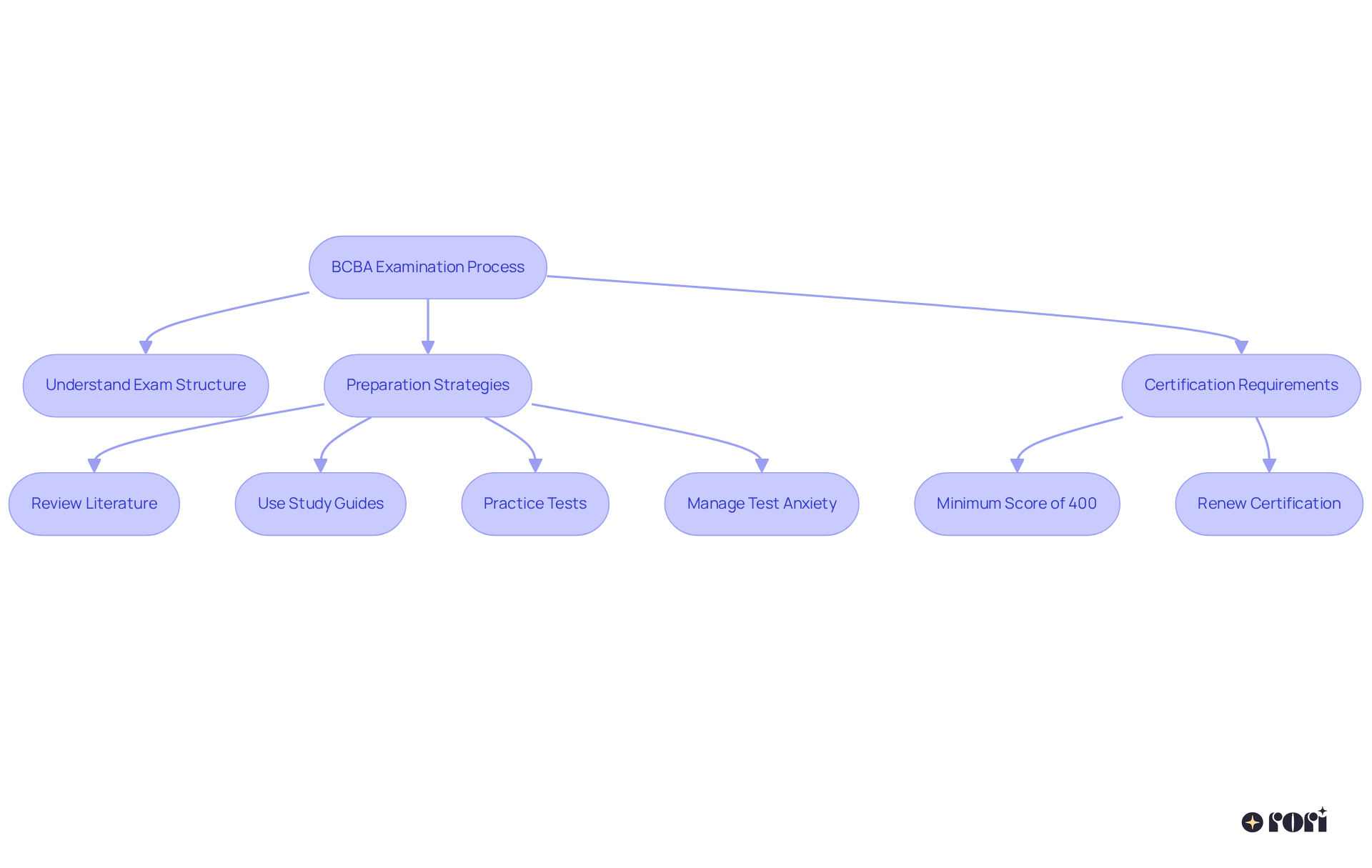Becoming a Board Certified Behavior Analyst (BCBA) is an exciting journey! To get started, you'll need to earn a master's degree in behavior analysis or a related field. Along the way, it's essential to complete at least 1,500 hours of supervised fieldwork—this hands-on experience is crucial! Finally, you'll take the BCBA certification exam to showcase your knowledge and skills.
This article dives into these requirements, highlighting the importance of practical experience and solid academic training. After all, we want to ensure that candidates are fully prepared to provide effective interventions based on applied behavior analysis principles. So, let’s explore this together and see how you can embark on this rewarding path!
Becoming a Board Certified Behavior Analyst (BCBA) is an exciting journey that requires dedication, education, and hands-on experience! As experts in applied behavior analysis, BCBAs play a crucial role in improving the lives of individuals with autism and other developmental disorders. In this article, we’ll explore the specific requirements for obtaining BCBA certification, from the necessary educational pathways to the supervised fieldwork and examination process.
What challenges might aspiring BCBAs face as they navigate this rigorous journey? Let’s dive in and discuss how you can effectively prepare to meet these demanding standards. Together, we can explore this path and support one another every step of the way!
A Board Certified Behavior Analyst (BCBA) is a skilled expert who has worked hard to meet rigorous educational and experiential standards. After passing a challenging certification exam in applied behavior analysis (ABA), they are ready to make a difference! BCBAs play a vital role in developing, implementing, and monitoring intervention plans based on ABA principles, particularly for individuals with autism and other developmental disorders. Their goal? To enhance social skills, reduce challenging behaviors, and improve overall quality of life.
The certification is recognized as a benchmark of excellence in the field, ensuring that practitioners have the necessary skills and knowledge to provide effective care. While the exact percentage of BCBAs working with children diagnosed with autism can vary, it’s clear that many BCBAs are dedicated to this important area. Studies show that having a certified behavior analyst involved can lead to better treatment outcomes, as their expertise significantly impacts the quality and effectiveness of support strategies. For example, Rori Behavioral Innovations Inc. has shared case studies that illustrate how data-driven approaches, combined with the involvement of BCBAs, can enhance treatment efficacy for children with autism.
To become a BCBA, individuals must know what are the requirements to be a BCBA. To understand what are the requirements to be a BCBA, one must:
This thorough training prepares BCBAs to implement data-driven strategies, aligning with the mission of organizations like Rori Behavioral Innovations Inc., which aims to transform ABA therapy through innovative and personalized care strategies. Insights from the chapter 'Implementation-Based Case Studies for Preschool-Age to School-Age Children' further emphasize how effective support strategies can lead to positive outcomes for children with autism.
Let’s explore this together! If you’re a parent navigating these challenges, remember, you’re not alone. We’re here to help you every step of the way!

If you're considering what are the requirements to be a BCBA, the journey typically starts with earning a master's degree in behavioral analysis, psychology, or a related field from an accredited institution. Many programs are designed with coursework that fulfills what are the requirements to be a BCBA as set by the Behavior Analyst Certification Board (BACB). You'll dive into key subjects like:
Some universities even offer supervised practicum experiences as part of their curriculum, which can really help you gain those practical skills you’ll need. Just remember, it’s important to choose a program that is accredited and helps clarify what are the requirements to be a BCBA according to the BACB's standards for certification. Let’s explore this together and find the right path for you!

An exciting journey awaits those interested in becoming a BCBA, and part of understanding what are the requirements to be a BCBA includes completing at least 1,500 hours of supervised fieldwork. This hands-on experience is so important! It includes direct interactions with clients, all under the guidance of a qualified supervisor. Think of it as a chance to really sharpen your skills in behavior assessment, intervention planning, and data analysis.
You can gather these hours in a variety of settings—schools, clinics, and even home-based programs. It’s all about finding the right fit for you! Just remember, understanding what are the requirements to be a BCBA means that supervision must align with BACB guidelines to ensure you get the training and mentorship you need. A key point to note regarding what are the requirements to be a BCBA is that at least 10% of your hours—150 hours, to be exact—must be supervised. This ensures you have the support you need along the way.
Research shows that this hands-on experience can greatly boost your chances of success on the BCBA certification exam. Why? Because it builds the confidence you need to implement effective ABA strategies in real-world situations. Plus, the structured supervision process requires that you observe a client at least once a month. This ongoing support and feedback are crucial for developing into a competent behavior analyst.
And here’s something important: you can’t accumulate fieldwork hours without meeting those monthly supervision requirements. This really highlights the essential role of mentorship in your training. Let’s explore this together and make sure you’re on the right path!

The BCBA examination is quite the challenge! It's designed to assess how well individuals understand the principles, ethics, and practices of Applied Behavior Analysis (ABA). With 150 multiple-choice questions, it dives into a variety of topics like behavior assessment, intervention strategies, and ethical considerations. If you're looking to register, you need to know what are the requirements to be a BCBA, which includes going through the Behavior Analyst Certification Board (BACB) and paying the necessary fees.
Now, let’s talk about preparation. Effective strategies are key to success! Many candidates spend several months getting ready, with a recommendation of about 100-150 hours of study time. This often involves:
Flashcards and study groups can also be a great way to enhance understanding through collaborative learning—after all, we learn better together!
To pass the exam, you’ll need to score at least 400 out of 500. This ensures that only qualified individuals understand what are the requirements to be a BCBA in order to earn the certification to practice. Remember, this certification isn’t forever; it’s valid for a specific period, and renewal is necessary. Managing test anxiety is also crucial. Techniques like deep breathing and mindfulness meditation can really help you stay calm and focused. The structured nature of the BCBA exam not only upholds high standards in autism care but also empowers clinicians to provide effective, evidence-based interventions for children with autism.
So, if you're gearing up for this journey, know that you're not alone! Let’s explore this together and make sure you feel prepared every step of the way!

Becoming a Board Certified Behavior Analyst (BCBA) is truly a journey filled with dedication, education, and hands-on experience. This certification not only showcases your skills in applied behavior analysis but also highlights your commitment to making a positive difference in the lives of individuals with autism and other developmental disorders. The journey involves some rigorous steps, like earning a master's degree, completing supervised fieldwork, and passing the certification exam, all of which prepare you for impactful roles in your community.
As you explore this path, you’ll discover valuable insights about educational pathways, the importance of supervised experience, and the challenges that come with the BCBA exam. Each of these components is vital in ensuring that you’re well-equipped to implement effective strategies and improve treatment outcomes. Plus, the focus on mentorship and hands-on experience emphasizes the collaborative spirit of this field, ultimately leading to better care for those who need it most.
With the growing demand for qualified BCBAs, it’s crucial to recognize the significance of your training and the responsibilities that come with certification. By choosing this path, you’re not just advancing your career; you’re also contributing to meaningful change in the lives of others. So, embrace this journey, seek out the right resources, and get ready to make a lasting impact in the field of behavior analysis. Let’s explore this together!
What is a Board Certified Behavior Analyst (BCBA)?
A BCBA is a skilled expert in applied behavior analysis (ABA) who has met rigorous educational and experiential standards, passed a certification exam, and is dedicated to developing, implementing, and monitoring intervention plans for individuals with autism and other developmental disorders.
What is the primary goal of a BCBA?
The primary goal of a BCBA is to enhance social skills, reduce challenging behaviors, and improve the overall quality of life for individuals they support.
How does the certification of a BCBA impact treatment outcomes?
The involvement of a certified behavior analyst can lead to better treatment outcomes, as their expertise significantly improves the quality and effectiveness of support strategies for individuals, particularly children with autism.
What are the requirements to become a BCBA?
To become a BCBA, individuals must earn a master’s degree in behavior analysis or a related field, complete supervised experience, and pass the Board certification exam.
How do BCBAs utilize data-driven strategies?
BCBAs implement data-driven strategies that align with the mission of organizations like Rori Behavioral Innovations Inc., focusing on innovative and personalized care strategies to enhance the efficacy of ABA therapy.
What role do case studies play in understanding the effectiveness of BCBAs?
Case studies, such as those shared by Rori Behavioral Innovations Inc., illustrate how data-driven approaches combined with the involvement of BCBAs can enhance treatment efficacy for children with autism.